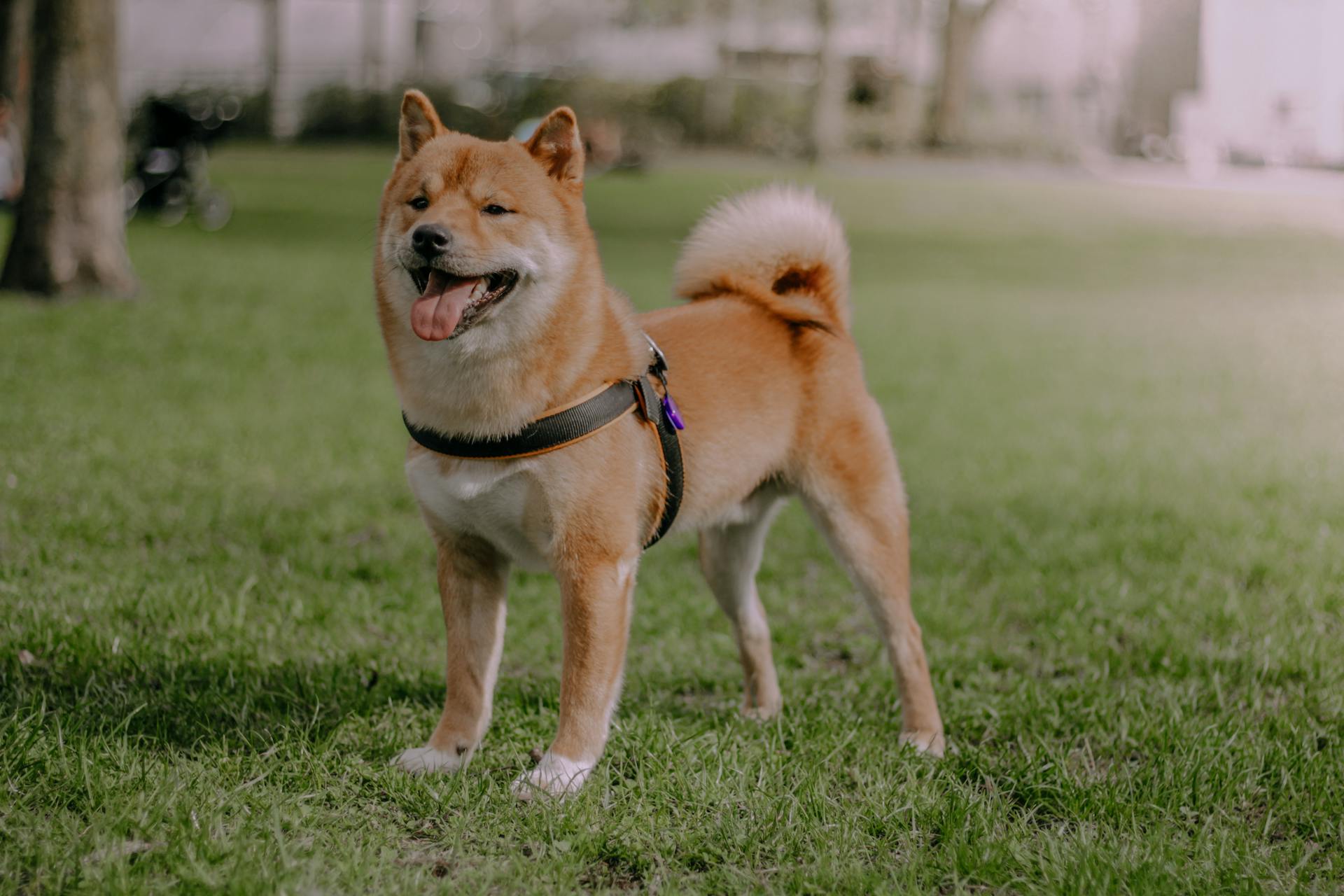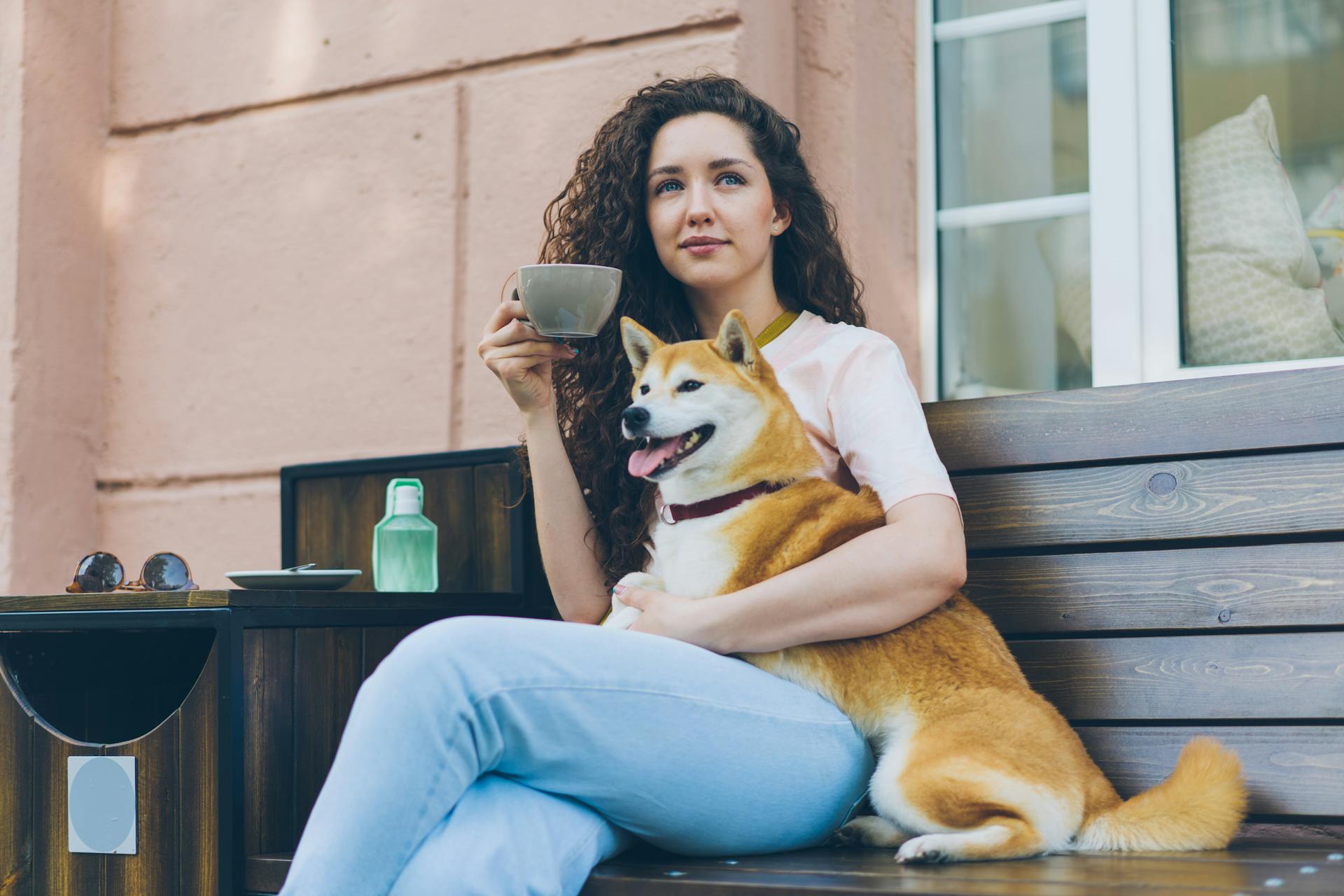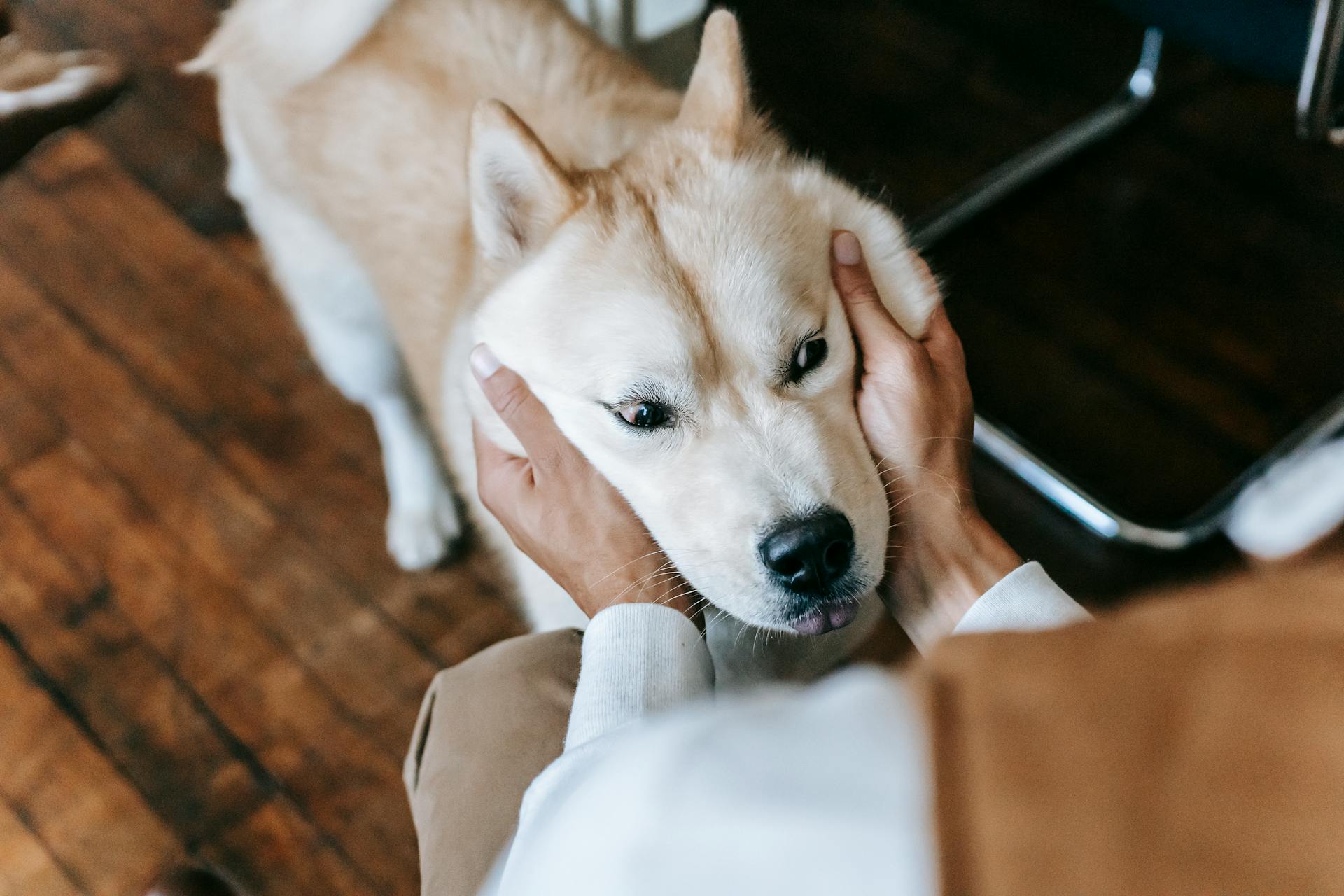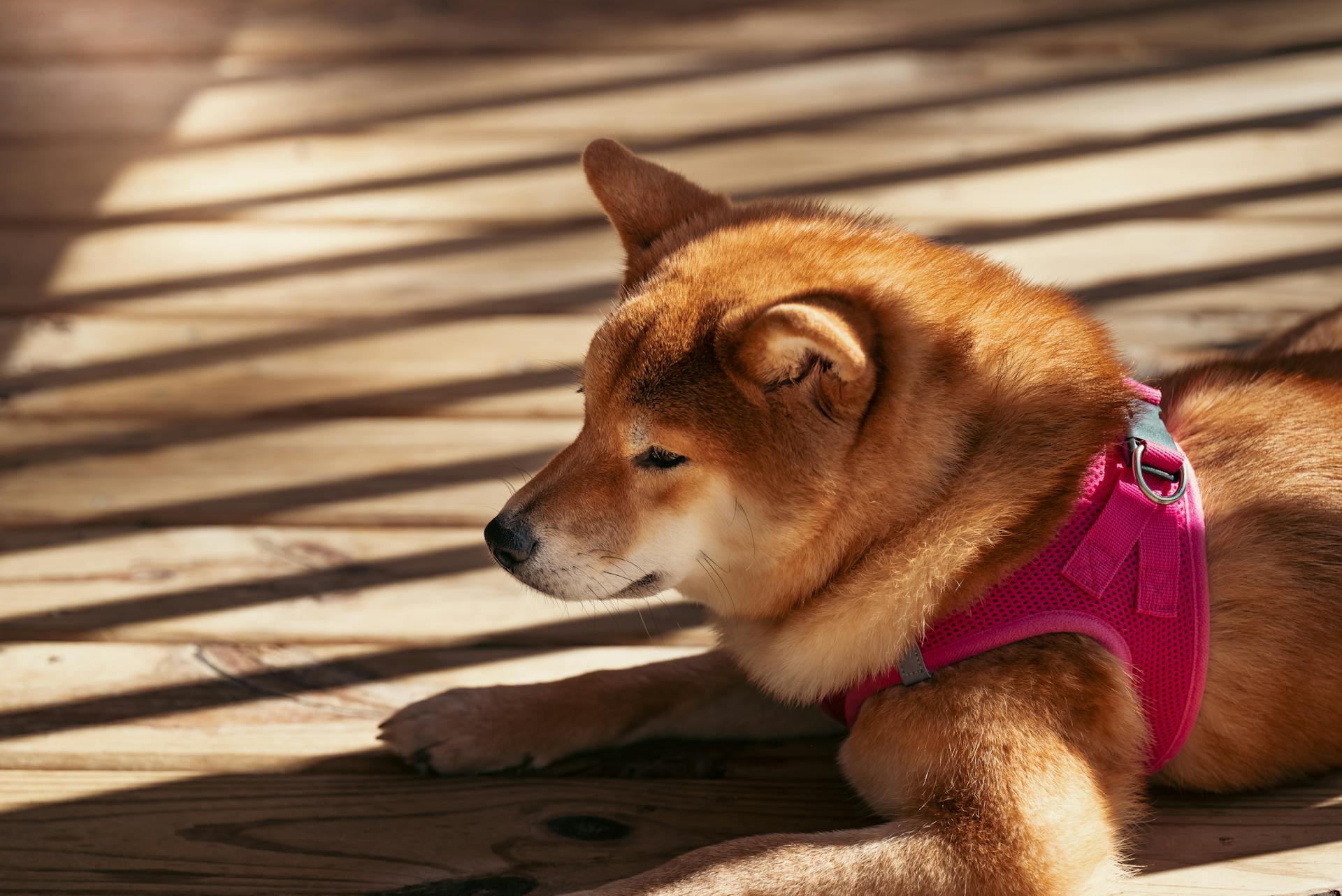
Welcoming a Shikoku dog puppy into your family is a thrilling experience, but it requires careful preparation. Shikoku dogs are a rare breed that originated in Japan and are known for their loyalty and intelligence.
They are relatively small in size, weighing between 15-25 pounds, and standing about 16-19 inches tall. Shikoku dogs are active dogs that require regular exercise to stay happy and healthy.
Before bringing your Shikoku puppy home, it's essential to create a safe and comfortable environment for them to grow and thrive. This includes setting up a puppy-proofed area in your home to prevent accidents and injuries.
With proper care and attention, your Shikoku puppy will grow into a loving and loyal companion.
On a similar theme: Shikoku Inu
Puppies
Finding a Shikoku puppy to adopt can be a challenge. They're not very common in the United States, so you may need to search far and wide to find one.
Your best chance of bringing home a Shikoku puppy is to find a reputable breeder who specializes in the breed. These breeders are more likely to have puppies available.
Related reading: Shikoku Inu vs Shiba Inu
However, it's always worth a shot to call your local animal shelter to see if they have any Shikokus available for adoption. You never know, you might be surprised to find a Shikoku in need of a loving home.
Once you bring your Shikoku puppy home, be prepared for their exuberant energy. They're a hunting dog with higher energy levels than the average dog, so make sure you're ready to provide plenty of physical and mental stimulation.
Providing your Shikoku dog with plenty of exercise and mental stimulation should keep them occupied and prevent destructive behaviors.
On a similar theme: When Do Dogs Lose Puppy Energy
Temperament & Intelligence
Shikoku dogs are alert, energetic companions with undying loyalty. They can be aloof at times, but their enthusiastic side comes out around their closest friends and family.
They are affectionate with their loved ones and willing to accept strangers into their inner circle, given enough time. However, they can be independent and challenging for novice dog owners to train.
The Shikoku can grow into a respectful, well-behaved dog with proper socialization and training, but they're strong-willed and clever. Experienced dog owners are recommended for the Shikoku dog since they can provide the stability and structure needed to train the breed effectively.
Shikoku dogs are intelligent, but they can be stubborn about learning. They require a fair amount of mental stimulation to stay happy and need regular and consistent training.
Related reading: Shikoku Dog Cost
Temperament & Intelligence
The Shikoku dog is an alert and energetic companion with undying loyalty, but they can be aloof at times. They're affectionate with their loved ones and willing to accept strangers into their inner circle, given enough time.
Their independence can make them challenging for novice dog owners to train, so experienced owners are recommended. The Shikoku can grow into a respectful, well-behaved dog with proper socialization and training.
Shikoku dogs are strong-willed and clever, requiring patient training and consistent structure. They have a high prey drive and should never be left alone with small pets, such as cats or guinea pigs.
See what others are reading: Shiba Inu Owner

The Shikoku dog is a good watchdog, as they are very alert and protective of their properties. They tend to bark only when they sense a serious issue occurring outside of their property.
Shikoku dogs are intelligent, but they can be somewhat stubborn about learning. They require a fair amount of mental stimulation to stay happy, and consistent training is necessary to prevent mischievous or territorial behavior.
These dogs are not overly affectionate and are not a good fit for families with very young children. However, they can be great companions for older children who have been raised with them and understand their needs.
Animal Interactions
The Shikoku dog's temperament is shaped by its history as a hunting dog, which can make it challenging to interact with other animals. They have a strong prey drive and will typically chase animals smaller than them.
Cats and prey animals don't make good companions for the Shikoku dog, as they may be seen as potential targets. This can lead to problems if you have other pets in the household.
The Shikoku dog may be over-protective when it comes to defending its owner or property against other dogs. This can make socialization and training crucial to ensure safe interactions with other dogs.
Care and Health
Shikoku dogs are generally healthy, but they can be prone to certain health issues if not cared for properly. A responsible breeder will conduct genetic testing to reduce the risk of passing on genetic conditions.
Shikoku dogs are known to suffer from eye conditions, including cherry eye and conjunctivitis, as well as retinal issues.
They can also experience relatively minor joint conditions such as hip dysplasia and patellar luxation. Regular veterinary care can help catch these issues early on.
Exercise and training are crucial for Shikoku puppies, requiring daily activity and consistent training to curb overprotectiveness and territorial behaviors. A patient owner is essential for this breed.
A Shikoku dog's diet and living space should be carefully considered, with a preference for a home with access to the outdoors and a secure, fenced-in area for them to run around.
Here is a list of potential health issues to watch out for:
- Elbow, knee, or hip dysplasia
- Luxating patella
- Epilepsy
- Allergies
With proper care, Shikoku dogs can live between 10-12 years, and up to 15 years in some cases.
Curious to learn more? Check out: 100 Years Ago Original Boston Terrier
Health Problems
Shikoku dogs are generally healthy, but like all breeds, they can be prone to certain health issues.
Genetic testing is crucial when selecting a responsible breeder to ensure their breeding stock doesn't pass down genetic conditions.
The Shikoku breed is known to suffer from eye conditions, which can range in severity and include cherry eye and conjunctivitis, as well as retinal issues.
Hip dysplasia and patellar luxation are also common joint issues that can affect Shikoku dogs.
These conditions can often be indicated by signs like limping or trouble standing up, sitting, or laying down.
Regular veterinary visits are essential to catch health problems before they become too serious.
Here are some possible health issues that Shikoku dogs may experience:
- Elbow, knee, or hip dysplasia
- Luxating patella
Additionally, Shikoku dogs may be prone to epilepsy and allergies, which can be caused by environmental conditions, food, fleas, and specific substances (contact dermatitis).
How Long Do They Live?
Shikoku dogs can live up to 15 years with proper care. Their lifespan is significantly influenced by the quality of care they receive.
On average, a Shikoku dog will live between 10 and 12 years. This is a relatively long lifespan for a dog of their size.
Making sure your Shikoku dog is healthy and happy is crucial to giving them the longest, most enjoyable life possible.
For your interest: Yorkshire Terrier Care
How to Care

Shikoku dogs require substantial exercise, grooming, and training, and they should be raised by experienced owners.
Daily exercise is essential for Shikoku dogs, and they need lots of activity to stay happy. Regular walks, outdoor activities like hiking, and fenced-in open areas to run around benefit this dog greatly.
Training is crucial for Shikoku dogs, and these pups benefit from regular and consistent training to help curb any overprotectiveness or territorial behaviors that may exhibit themselves as aggression.
Shikoku dogs can be stubborn, so patience is a must if you add this dog into your family. They thrive on positive reinforcement and consistent boundaries.
Your Shikoku dog will need their own space in your home, and your home will preferably have access to the outdoors. This dog might be too active and large to do well in a small apartment home.
Regular veterinary care is necessary to keep your Shikoku dog healthy and happy, and a good diet is also essential to support their overall well-being.
Recommended read: Shiba Inu Exercise Needs
Diet and Nutrition
Feeding your Shikoku dog puppy requires careful consideration to ensure they receive the nutrients they need to grow strong and healthy.
A high-quality diet is essential for your Shikoku dog puppy, with a focus on protein, fat, minerals, vitamins, and healthy carbs.
You can choose between commercial food or a home-prepared meal, but make sure your veterinarian signs off on your dietary plan.
Shikoku dogs need plenty of protein to fuel their active lifestyles, so look for brands that are high in protein and rich in essential vitamins and minerals.
To avoid obesity and related health problems, feed your Shikoku dog puppy in appropriate amounts, and consult your veterinarian to determine a healthy diet and portion schedule.
Feeding your Shikoku dog puppy between one and three cups of food per day is a good starting point, but this may vary depending on their size and exercise level.
Exercise and Training
Exercise and training are crucial for a Shikoku dog puppy. They need daily physical and mental stimulation to prevent boredom and destructive behavior.
Shikoku dogs are energetic and love to play, so activities like playing fetch, going for long walks, and playing tug-of-war are great ways to keep them engaged. They also enjoy hide-and-seek, swimming, hiking, and jogging.
However, due to their reserved nature, Shikoku dogs also appreciate some alone time in a fenced-in backyard. This can help them relax and recharge.
The Shikoku breed is intelligent and can be trained with positive reinforcement techniques, but they can be stubborn and independent. Consistent and fair training is essential to bring out the best in them.
Early socialization is vital for Shikoku puppies, as they can become overprotective and territorial if not exposed to new people and environments from an early age. Positive reinforcement training methods are recommended, as punishments and harsh corrections can cause them to become fearful and disengage from the learning process.
Trainability
Training your Shikoku dog requires patience and consistency. They can be stubborn and strong-willed, making it challenging to keep them focused.

Positive reinforcement is an effective training tool for Shikoku dogs. They enjoy pleasing their owners and will thrive with rewards and praise.
Punishments and harsh correction methods can cause your Shikoku dog to become fearful and disengage from the learning process. This can be detrimental to their development and relationship with you.
Early socialization is crucial for Shikoku puppies. It helps curb overprotectiveness and allows them to live peacefully with other family pets.
Daily training is essential for Shikoku dogs. They have a high prey drive and can become territorial or aggressive if not properly trained.
Shikoku dogs are intelligent and can learn complex tasks like working dog tasks. However, it takes a lot of patience and consistency to get them there.
Exercise
Exercise is an essential part of a Shikoku dog's daily routine. Playing fetch is a great way to keep your Shikoku active.
Long walks and playing tug-of-war are also excellent options for exercise. The Shikoku is a hunting dog with lots of energy to burn, so owners must commit to providing abundant daily exercise.

Try hiding treats or toys around the house or yard for your Shikoku to sniff out, a great way to provide mental stimulation. Playing hide-and-seek is a fun way to engage your Shikoku's sense of smell.
Swimming is another excellent activity for Shikoku dogs, providing a great workout and a fun way to cool off. Always keep your Shikoku on a leash or in a safely enclosed place like your backyard.
Hiking and exploring are also great ways to provide exercise and mental stimulation for your Shikoku. Bred to hunt for centuries, the Shikoku simply cannot be trusted off-leash as it may go after other animals.
A unique perspective: Bull Terrier Fun Facts
Frequently Asked Questions
How much does a Shikoku puppy cost?
A Shikoku puppy's total cost can range from $3,000 to $6,000 or more, depending on the dog's quality and shipping fees. If you're considering bringing a Shikoku home, learn more about the breed and its needs.
Are Shikoku dogs rare?
Yes, Shikoku dogs are a rare breed both in the United States and Japan. Their scarcity makes them a unique and intriguing choice for dog owners.
How big are Shikoku Inu dogs?
Shikoku Inu dogs typically weigh between 31-51 pounds and stand approximately 18.5-20 inches tall. They are considered a medium-sized breed.
Featured Images: pexels.com


